Miracle Crusade!

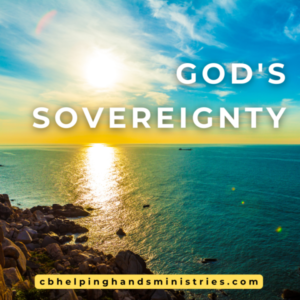
As believers, we’ve all faced the daunting question: “How can we trust that God is always good and always in control when bad things happen?” It’s a question that has puzzled and perplexed many of us, leaving us wondering if God is truly sovereign or just a distant deity who allows evil to prevail.
In the Bible, God’s sovereignty is a central theme that runs throughout the narrative. From Genesis to Revelation, we see God’s power and control over creation, from the smallest atoms to the vast expanse of the universe. The Bible teaches that God is the all-knowing, all-powerful, and all-loving Creator who is actively involved in the lives of His people.
One of the most iconic passages on sovereignty is Psalm 135:6-7, which declares: “Whatever the Lord pleases, he does. In heaven and on earth, in the seas and all its depths, he lets it happen.” This verse underscores God’s absolute authority and control over all creation.
Another important passage is Isaiah 46:10-11, which states: “My counsel shall stand, and I will accomplish all my purpose. Calling a bird of prey from the east, the man of my counsel from a far country. I have spoken, and I will bring it to pass; I have purposed, and I will do it.” Here, God explicitly declares His plan to accomplish His purpose and bring it to pass.
From a philosophical perspective, the concept of sovereignty raises questions about free will and determinism. Some argue that if God is truly sovereign, then human free will is an illusion. Others propose that God’s sovereignty implies a lack of human agency.
Romans 8:28-29, which states: “We know that for those who love God all things work together for good, for those who are called according to his purpose. For those whom he foreknew he also predestined to be conformed to the image of his Son.”
In this passage, Paul emphasizes that even though we are subject to various circumstances, God’s sovereign plan ensures that all things work together for good for those who love Him.
God’s sovereignty is often linked to His character attributes such as goodness, justice, and love. The Bible teaches that God is good (Psalm 34:8), just (Psalm 119:137), and loving (1 John 4:8). These attributes are essential components of His sovereignty.
God’s sovereignty is not just a theoretical concept; it is a living reality that has been demonstrated throughout history. While bad things may happen, we can trust that God is always good and always in control. The Bible teaches us that God’s sovereignty is not at odds with human free will but rather complements it.
As we navigate life’s challenges and uncertainties, we can find comfort in knowing that God has a plan for us (Jeremiah 29:11). His sovereignty is not limited by human circumstances but rather extends beyond them. We can rest assured that even in the darkest moments, God is working everything together for our good (Romans 8:28).
Apostle Shelia
SBI Ministries
C.B. Helping Hands Ministries
Follow Us
Stay up-to-date with our latest articles and insights by following us on social media:
https://www.facebook.com/CBHelpingHands
This website is a treasure trove of valuable information, and we’re committed to keeping it free for everyone. If our content has made a positive impact on your life, consider supporting us with a donation to help us continue sharing knowledge freely.
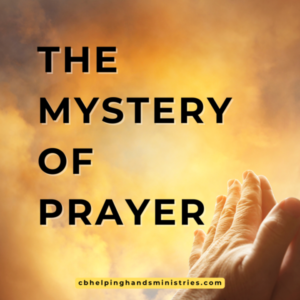
Prayer is often seen as a simple act of speaking to God, but it’s much more complex than that. The mystery of prayer lies in the fact that it’s not just about speaking words, but about connecting with a higher power on a deeper level.
One of the most important aspects of prayer is intention. When we pray with intention, we focus our minds and hearts on a specific goal or outcome. This can help us to overcome obstacles and achieve our goals more effectively.
Intention also plays a critical role in manifesting our desires. When we pray with intention, we’re sending a clear message to the universe about what we want to achieve. This can help to attract positive energies and manifest our desires in our lives.
Faith is another critical component of prayer. When we pray with faith, we trust that God is listening and that our prayers will be answered. Faith helps us to overcome doubt and uncertainty, allowing us to connect with God more deeply.
Some believe that unanswered prayers are a result of God’s will not aligning with our own desires. Others believe that unanswered prayers are a test of our faith or a way for us to learn and grow.
Ultimately, the mystery of answered prayers is a reminder that God’s ways are not always our ways. We must trust that God knows what’s best for us and that every experience, whether it’s answered or unanswered prayer, is part of His plan for our lives.
Remember that prayer is not just about speaking words – it’s about connecting with God on a deeper level. By approaching prayer with intention, faith, and an open heart, we can unlock its power and experience the transformative benefits it has to offer.
Apostle Shelia
SBI Ministries
C.B. Helping Hands Ministries
Follow Us
Stay up-to-date with our latest articles and insights by following us on social media:
https://www.facebook.com/CBHelpingHands
This website is a treasure trove of valuable information, and we’re committed to keeping it free for everyone. If our content has made a positive impact on your life, consider supporting us with a donation to help us continue sharing knowledge freely.
This website offers a wealth of valuable information, and we are dedicated to maintaining free access for all. If our content has positively influenced your life, please think about supporting us with a donation to help ensure we can keep sharing knowledge without charge.
God & Suffering
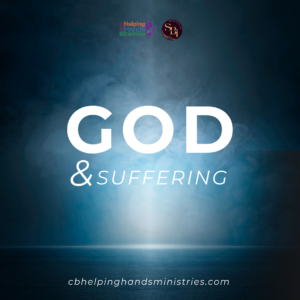
Suffering is an inevitable part of the human experience. Whether it manifests as the loss of a loved one, illness, betrayal, or personal struggles, pain can be profound and deeply disorienting. For many people, suffering raises challenging questions about the nature of God: If God is loving and all-powerful, why does He allow suffering?
The Book of Job in the Bible, for example, presents profound questions about divine justice in the face of intense suffering. Job’s struggles lead him to explore the depths of his faith, ultimately recognizing that human understanding is limited compared to the divine perspective.
While suffering is painful, it can also serve as a catalyst for personal growth and spiritual development. Many people find that their toughest experiences lead to profound insights and greater empathy toward others.
In times of suffering, many individuals turn toward their faith as a source of solace and strength. Prayer, meditation, and engagement with sacred texts can provide comfort and clarity. Many religious traditions emphasize the importance of seeking God in moments of despair.
One of the vital aspects of coping with suffering is the role of community. Faith communities can offer support, encouragement, and companionship during challenging times. Shared worship, prayer circles, and group discussions can help individuals feel less isolated in their pain. When we gather in vulnerability, suffering can become a shared journey, uniting us in our humanity.
While suffering is a reality, so is hope. Many faith traditions emphasize the promise of healing and redemption. In Christian teachings, the concept of resurrection signifies that suffering is not the end; there is hope for renewal and restoration. Similarly, various other spiritual paths speak to the cyclical nature of life, where pain gives way to healing, darkness to light.
The relationship between God and suffering is complex and multifaceted. While it can be tempting to view suffering as a punishment or abandonment, many find that it can lead us toward deeper faith, understanding, and compassion. As we navigate our own suffering and that of others, may we hold space for the mystery of divine presence, even in our darkest hours. Embracing our pain, seeking community, and reaching out for hope can transform our suffering into a profound journey of faith and resilience. In moments of despair, remember: you are not alone. God walks with us through the valleys, offering comfort, purpose, and ultimately, love.
Apostle Shelia
SBI Ministries
C.B. Helping Hands Ministries
This website is a rich source of valuable insights, and we’re dedicated to maintaining free access for all. If our content has positively influenced your life, please consider making a donation to help us continue providing knowledge at no cost.
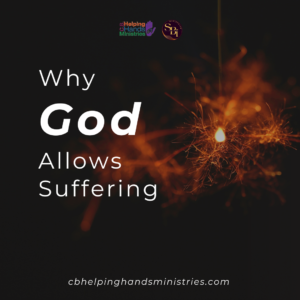
Suffering is an inherent part of the human experience. It comes in many forms, from physical pain and illness to emotional turmoil and loss. For many, the existence of suffering poses a profound question: why would a loving and all-powerful God allow such hardships to afflict His creation? This query has puzzled theologians, philosophers, and everyday people for centuries.
One possible explanation is that suffering serves a greater purpose. It can be a catalyst for growth, a test of faith, and an opportunity for spiritual refinement. Through tribulations, individuals may develop resilience, empathy, and a deeper understanding of themselves and the world around them. The Bible, for instance, teaches that suffering can be a means of spiritual purification, as seen in the stories of Job and Joseph.
Another perspective is that God’s gift of free will to humanity allows for the possibility of suffering. When individuals exercise their freedom to make choices, they may opt for paths that lead to harm, whether to themselves or others. This freedom, though sometimes misused, is essential for genuine relationships, personal growth, and the development of character. In this sense, suffering can be a consequence of human decisions rather than a direct act of God.
The presence of evil and its role in suffering is another aspect to consider. While God is not the author of evil, He does allow it to exist, which can be perplexing. The Bible suggests that evil is a rebellion against God’s sovereignty, originating from the choice of angels and humans to oppose His will. This struggle between good and evil plays out in the world, contributing to the suffering we experience.
Perhaps the most comforting perspective on suffering is the assurance of God’s presence within it. The Christian narrative, for example, emphasizes that God is not distant from suffering but has entered into it through the incarnation of Jesus Christ. Jesus’ life, marked by suffering and culminating in the cross, demonstrates God’s willingness to bear the burdens of humanity. This divine solidarity offers hope and comfort to those enduring hardships, reminding them that they are not alone in their pain.
The question of why God allows suffering is complex and multifaceted, defying simplistic answers. While we may not fully understand the reasons behind suffering, we can find solace in the belief that it is not devoid of purpose or God’s presence. Through faith, we can approach suffering with a sense of hope and meaning, trusting that even in the darkest moments, God is working towards redemption and restoration. Ultimately, the mystery of suffering invites us to deepen our relationship with God, to seek His comfort, and to find ways to alleviate the hardships of those around us, embodying the love and care that God has for His creation.
Apostle Shelia
SBI Ministries
C.B. Helping Hands Ministries
Your generous donations play a vital role in spreading the message of God’s healing power and grace. By supporting the creation of valuable content that uplifts and inspires, you contribute to the journey of individuals seeking solace and hope through the teachings of the Bible. Together, we can make a difference in the lives of those in need of spiritual healing and restoration. Your support is greatly appreciated as we continue to share the transformative power of God’s grace with the world.

The relationship between God’s sovereignty and human free will is a profound and often debated topic in theology and philosophy. At its core, God’s sovereignty refers to His ultimate authority and control over all creation, while human free will denotes the ability of individuals to make choices independent of external coercion.
God’s sovereignty is emblematic of His omnipotence and omniscience. Scripture, particularly in books like Romans and Psalms, illustrates that God is in absolute control of the universe. His plans and purposes are unfaltering, and nothing occurs outside of His divine will. This assurance provides believers with comfort, especially in times of uncertainty, as it affirms that God is always working for the good of those who love Him.
In parallel, human free will emphasizes the responsibility and moral agency of individuals. Many theological perspectives assert that while God is sovereign, He grants humanity the ability to choose—whether to follow Him or to reject Him. This choice is essential for genuine relationships, allowing love, repentance, and faith to flourish.
The seeming conflict between divine sovereignty and human agency has given rise to various theological interpretations. Some argue for determinism, suggesting that God’s predestination removes the element of free choice. Others advocate for Arminianism, positing that God’s grace enables human decisions without undermining His control.
This tension can be likened to a great symphony, where God’s sovereignty sets the grand design and human free will plays its distinct notes within that framework. Each note is essential; together, they create a harmonious existence that reflects the complexity of life and faith.
Ultimately, God’s sovereignty and human free will are not mutually exclusive but rather intertwined elements of the human experience. Acknowledging both allows for a deeper understanding of our relationship with God, embracing the mystery of faith while recognizing our role in the divine narrative. Believers are called to trust in God’s perfect plan while exercising their free will to love and serve Him and others. This duality enriches the Christian journey, empowering us to live with purpose and hope.
Apostle Shelia
SBI Ministries
C.B. Helping Hands Ministries
Your generous donations play a vital role in spreading the message of God’s healing power and grace. By supporting the creation of valuable content that uplifts and inspires, you contribute to the journey of individuals seeking solace and hope through the teachings of the Bible. Together, we can make a difference in the lives of those in need of spiritual healing and restoration. Your support is greatly appreciated as we continue to share the transformative power of God’s grace with the world.
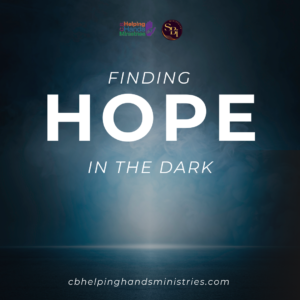
In moments of deep sorrow, confusion, or despair, it can often feel like we are navigating through an impenetrable dark tunnel, with little hope of finding light again. For individuals grappling with mental health issues, trauma, or emotional pain, this darkness can be overwhelming. However, for many, God’s Word serves as a beacon of hope, offering guidance, comfort, and a sense of belonging in the midst of life’s storms.
First, it’s essential to acknowledge that mental health struggles are a reality for many people. According to recent studies, one in five adults in the U.S. experiences mental illness each year. These experiences can include anxiety, depression, PTSD, and more, leading individuals to feel isolated and desperate for relief. In times like these, it’s easy to feel as though you are the only one experiencing such pain, but God’s Word assures us of His presence and understanding.
The Bible is replete with verses that resonate with the struggles we face. For those feeling anxious, Philippians 4:6-7 offers reassurance:
“Do not be anxious about anything, but in every situation, by prayer and petition, with thanksgiving, present your requests to God. And the peace of God, which transcends all understanding, will guard your hearts and your minds in Christ Jesus.”
This passage reminds us that we can bring our worries and pains before God. It suggests a powerful exchange: our anxiety for His peace. Knowing that we can unburden our hearts can be a significant step in the healing process.
Psalm 34:18 echoes a similar sentiment: “The Lord is close to the brokenhearted and saves those who are crushed in spirit.” This verse is a powerful reminder that we are never truly alone in our darkest moments. God is drawn to our pain and stands ready to comfort us. When we choose to lean into our faith, we can find solace and strength in knowing that He is walking alongside us.
Moreover, God calls us to be part of a community. Ecclesiastes 4:9-10 states, “Two are better than one, because they have a good return for their labor: If either of them falls down, one can help the other up.” This is an invitation to reach out to others, seek support, and share our burdens. Church communities, support groups, and friendships can offer not only emotional support but also practical assistance and encouragement.
Prayer, journaling, and reflection can also play significant roles in healing. Psalm 62:8 encourages us to “trust in Him at all times, you people; pour out your hearts to Him, for God is our refuge.” Pouring out our hearts in prayer allows us to express our innermost fears, desires, and struggles. The act of writing or speaking to God can bring clarity and a sense of relief, helping to cultivate hope even in challenging times.
It’s important to remember that healing is a journey. 2 Corinthians 12:9 assures us that God’s grace is sufficient, and His power is made perfect in our weakness. This can be a comforting truth when we feel we are at our lowest. The acknowledgment that God meets us in our weakness enables us to accept our struggles and foster growth through them.
Finding hope in the darkness takes courage, faith, and often the support of others. While the journey through mental health struggles can feel lonely and overwhelming, we are reminded through Scripture that God sees us, hears our cries, and walks with us. By engaging with His Word, reaching out to the community, and embracing the healing processes of prayer and reflection, we can find the strength to rise above our pain. In doing so, we not only find hope for ourselves but also become beacons of light for others navigating their own dark paths.
As we continue to seek help and healing, let us hold fast to the promises of God’s Word, allowing it to illuminate even the darkest corners of our lives. No matter how deep the pain, hope is always within reach.
Apostle Shelia
SBI Ministries
C.B. Helping Hands Ministries
Your generous donations play a vital role in spreading the message of God’s healing power and grace. By supporting the creation of valuable content that uplifts and inspires, you contribute to the journey of individuals seeking solace and hope through the teachings of the Bible. Together, we can make a difference in the lives of those in need of spiritual healing and restoration. Your support is greatly appreciated as we continue to share the transformative power of God’s grace with the world.
Following Jesus’ Example in a Broken World

In a world that often feels chaotic and fragmented, figuring out how to navigate life can be particularly daunting. Amid global challenges, personal struggles, and societal injustices, many of us grapple with questions about purpose, direction, and hope. In these turbulent times, looking to the life and teachings of Jesus offers us an anchored perspective and a powerful example to follow.
At the core of Jesus’ ministry was compassion. He saw the suffering of those around him, from the marginalized to the sick, and he responded with love, grace, and action. In our broken world, we might feel overwhelmed by the enormity of pain—poverty, discrimination, mental health challenges, and environmental degradation are just a few of the issues we face. However, Jesus encourages us to act, no matter how small our efforts may seem.

Practical Steps:
1. Listen to Others: Before we act, we must understand the struggles of those around us. Take time to listen—you’ll find stories of pain that can inspire a response.
2. Get Involved: Volunteer at local shelters, food banks, or community organizations. Even small acts of kindness can ripple out into the larger community.
3. Advocate: Use your voice to raise awareness about social justice issues. Jesus cared for the oppressed; we can do the same by highlighting injustices in our communities.
One of the most radical elements of Jesus’ teachings is His emphasis on forgiveness. In a world plagued by grudges, misunderstandings, and conflicts, choosing to forgive may feel counterintuitive. Yet, Jesus demonstrated this principle on the cross, asking God to forgive those who crucified Him.
Forgiveness does not mean we condone wrong actions or forget them; rather, it frees us from the burden of bitterness.
Practical Steps:
1. Reflect: Take time to reflect on your own experiences of hurt. What grudges are you holding onto? Who do you need to forgive?
2. Talk it Out: Sometimes, discussing feelings with a trusted friend or counselor helps in processing emotions and finding a path to forgiveness.
3. Practice Small Acts of Grace: In everyday interactions, consciously choose to respond with kindness and patience. It may inspire others to do the same.
Throughout His ministry, Jesus took time to be with those society deemed “the least of these.” Whether it was sharing a meal with tax collectors or protecting a woman caught in adultery, Jesus demonstrated that everyone deserves dignity and respect.
In today’s world, this means intentionally reaching out to people in vulnerable positions—whether due to economic hardship, mental illness, or other forms of marginalization.
Jesus’ resurrection is not just a story of defeat turned into victory; it’s a promise of hope for all of us. In a world that often feels heavy with despair, it is vital to hold onto the hope that Jesus offers. This hope is not just about future salvation but about living each day with purpose and faith, even in challenging times.
Following Jesus’ example in a broken world isn’t about perfection; it’s about progress. It’s about choosing to be present, compassionate, and hopeful, even amidst chaos. In doing so, we not only transform our own lives but also make a profound impact on the lives of those around us. Let’s commit to embodying the love and light of Christ in every situation, spreading His message of peace and restoration in a world desperately in need of healing.
Apostle Shelia
SBI Ministries
C.B. Helping Hands Ministries
Your generous donations play a vital role in spreading the message of God’s healing power and grace. By supporting the creation of valuable content that uplifts and inspires, you contribute to the journey of individuals seeking solace and hope through the teachings of the Bible. Together, we can make a difference in the lives of those in need of spiritual healing and restoration. Your support is greatly appreciated as we continue to share the transformative power of God’s grace with the world.
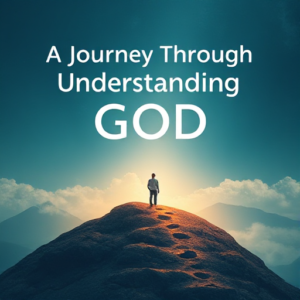
In a world filled with uncertainties and rapid change, the quest for understanding God remains a timeless journey for many. Whether spurred by curiosity, personal crisis, or a deep-seated need for connection, the path to understanding the divine is unique for each of us.
Understanding God begins with grappling with the foundational beliefs of various religious traditions. Different religions offer diverse perspectives on the nature of God, the universe, and humanity’s place within it.
Monotheism vs. Polytheism: Explore the contrasts between traditions that worship a single deity, like Christianity, Islam, and Judaism, and those that embrace multiple gods, such as Hinduism. Each perspective provides a unique lens through which to view the divine.
For many, understanding God is not just an intellectual pursuit; it is deeply personal and experiential.
Reflect on moments in life when you felt a connection to something greater—during contemplative prayer, meditation, or even in nature. What do these experiences teach you about the divine?
Often, profound understanding emerges from doubt and hardship. How can struggles with faith lead to deeper insights? Embracing periods of questioning can be an integral part of spiritual growth.
The journey to understand God is rarely traveled alone. Community plays a vital role in shaping our beliefs and experiences. Acts of service are fundamental to many faith traditions. Participating in community service can illuminate the nature of God as experienced through love and compassion in action.
The journey to understanding God often culminates in introspection and the cultivation of spiritual practices.Explore various forms of prayer and meditation as tools for deepening your relationship with God. Each practice offers a unique method of stillness, reflection, and connection.
Understanding God is not a destination but an ongoing journey. Embrace the uncertainty and fluidity of this path, recognizing that growth often comes from the willingness to question and explore. As you evolve, so too may your understanding of God. Allow yourself the grace to adapt and reconsider your beliefs as you gain new experiences and insights.
The journey through understanding God is as diverse and multifaceted as humanity itself. By engaging with theological foundations, personal experiences, community connections, and reflective practices, we can deepen our understanding and cultivate a profound relationship with the divine. Ultimately, this journey is about seeking truth, fostering compassion, and embracing the mystery that lies beyond our comprehension.
Let us walk this journey together, sharing insights and questions, and growing in our appreciation of the wondrous complexities of faith and the Divine.
Apostle Shelia
SBI Ministries
C.B. Helping Hands Ministries
Your generous donations play a vital role in spreading the message of God’s healing power and grace. By supporting the creation of valuable content that uplifts and inspires, you contribute to the journey of individuals seeking solace and hope through the teachings of the Bible. Together, we can make a difference in the lives of those in need of spiritual healing and restoration. Your support is greatly appreciated as we continue to share the transformative power of God’s grace with the world.

In our spiritual journey, understanding and embracing God’s grace and forgiveness are essential aspects that deepen our faith and strengthen our relationship with the divine. His grace is the unmerited favor bestowed upon us, demonstrating God’s boundless love and compassion. It is through His grace that we receive forgiveness for our shortcomings and find redemption.
Reflect on the immense gift of God’s grace in your life. Understand that His grace is not earned or deserved but freely given to all who seek it. Embrace the knowledge that despite our imperfections, God’s grace is always available, offering us the opportunity for healing, growth, and transformation.
Forgiveness is a cornerstone of our faith journey. Just as God extends His forgiveness to us, we are called to forgive others. Embracing forgiveness allows us to release resentment and find peace within ourselves. It is through forgiveness that we can experience healing, restoration, and reconciliation in our relationships.
Through prayer, meditation, and reflection on His teachings, seek guidance from God to deepen your understanding of His grace and forgiveness. Allow His wisdom to illuminate your heart and mind, opening yourself to His divine presence and guidance.
As you grow in your understanding of God’s grace and forgiveness, extend the same compassion and forgiveness to others. Practice empathy, kindness, and understanding, mirroring the example set by our faith teachings. In doing so, you not only deepen your faith but also contribute to a more loving and compassionate world.
Remember, understanding His grace and forgiveness is a lifelong journey of growth and learning. It is through this journey that we can experience the transformative power of His love and find solace in His divine presence. Let His grace and forgiveness guide you as you continue to deepen your faith and walk in His light.
Apostle Shelia
SBI Ministries
C.B. Helping Hands Ministries
Your generous donations play a vital role in spreading the message of God’s healing power and grace. By supporting the creation of valuable content that uplifts and inspires, you contribute to the journey of individuals seeking solace and hope through the teachings of the Bible. Together, we can make a difference in the lives of those in need of spiritual healing and restoration. Your support is greatly appreciated as we continue to share the transformative power of God’s grace with the world.
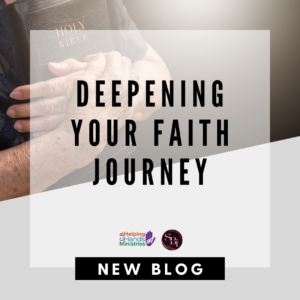
Deepening our faith journey is a continuous process of growth, reflection, and connection with the divine. It involves nurturing our spiritual well-being, seeking a deeper understanding of our beliefs, and cultivating a stronger relationship with God.
Here are a few practices that can help us in this transformative journey:
Daily Devotion: Set aside dedicated time each day to engage in prayer, meditation, or scripture reading. By consistently nourishing our spiritual selves, we open our hearts to divine guidance and wisdom.
Seeking Spiritual Community: Engage with like-minded individuals who share your faith. Joining a religious community or attending spiritual gatherings can provide opportunities for fellowship, support, and shared learning, fostering growth and connection.
Exploring Sacred Texts: Dive into the rich teachings and wisdom found in sacred texts and scriptures of your faith tradition. Reflect on the profound messages and seek their application in your daily life, allowing them to shape your thoughts, actions, and decisions.
Service and Acts of Kindness: Engaging in acts of service and kindness is a powerful way to deepen our faith. Extend compassion and help to those in need, following the example set by our faith teachings. Serving others not only strengthens our connection with God but also brings us closer to the divine purpose of love and compassion.
Reflecting on Spiritual Experiences: Take time to reflect on moments when you have felt a strong connection with the divine. Whether it’s during prayer, worship, or moments of solitude, these experiences can serve as anchors in your faith journey. Embrace the emotions evoked and seek to recreate and deepen those connections.
Remember, deepening your faith journey is a personal and unique process. Allow yourself the freedom to explore different practices and approaches that resonate with your spiritual beliefs and aspirations.
Embrace the transformative power of gratitude, seek knowledge and understanding, and nurture your relationship with the divine as you continue to grow and deepen your faith journey.
Apostle Shelia
SBI Ministries
C.B. Helping Hands Ministries
Your generous donations play a vital role in spreading the message of God’s healing power and grace. By supporting the creation of valuable content that uplifts and inspires, you contribute to the journey of individuals seeking solace and hope through the teachings of the Bible. Together, we can make a difference in the lives of those in need of spiritual healing and restoration. Your support is greatly appreciated as we continue to share the transformative power of God’s grace with the world.